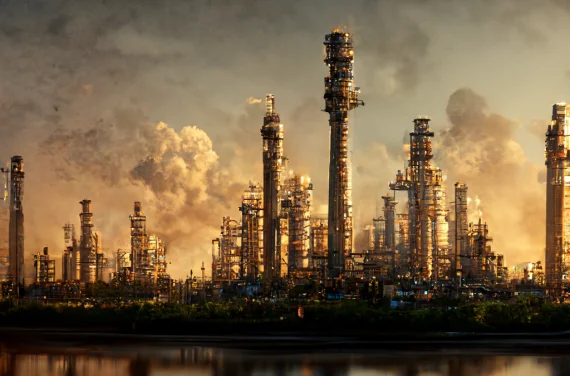Escort interpreting during the refurbishment of the refinery came our way in August and September this year. It was supposed to be a standard assignment. A German refinery commissioned a Polish company to carry out assembly work. The latter employed seven German translators to ensure smooth communication between the client and its employees. Three translators were provided by Berlineo. It was tough, but as always we made it.
Escort interpreting at the refinery - specifics of the job
We were a little surprised when, on arrival at the site of the service, we were asked if we had experience in interpreting at a refinery site. We specialise in translations for industry, the the technical translators we work with know their stuff - they are familiar with technical subjects. Not only do they have a technical or philological background combined with a passion for technology, but they are hardworking, capable of working three shifts when necessary, and have been on more than one construction sites or plants.
In fact, the only thing that may surprise us in an unfamiliar industry is the technical vocabulary. However, after a maximum of two days of work, any professional interpreter is able to pick up most of the necessary technical terms. Usually, the most important aspect is to understand the processes of the plant or construction site and to become familiar with the tasks and positions of the people who need interpreting.
In terms of content, the refinery is not particularly different from other places where we provide interpretation. However, other factors played a significant role. The PPE in place at the refinery includes not only safety shoes (S3), but also clothing made of non-flammable fabrics (long sleeves, full), a helmet, safety goggles, gloves and hearing protection. In addition, you have to wear a gas detector strapped to your clothing at all times, and as interpreters we were additionally equipped with walkie-talkies.
Escort interpreting at the refinery - working conditions
In addition to the listed PPE, which significantly hinders and slows down movement and contributes to faster fatigue when the ambient temperature is sufficiently high,several other factors affected the interpreters' performance. If you've had a good look at the photo above, you'll no doubt have noticed that pipework can be relatively high up. In some cases reaching heights of more than 30 metres.
Yes, even up there, the fitters need translation and this cannot be provided remotely. What is more, only German-speaking people can give directions to the crane operator once the dismantled pipes have been moved by crane up to the ground surface.
At this point, I would like to give special credit to Filip, who, in cooperation with a crane operator, successfully brought down several heavy pipes on the second day of work. It should be noted here that the crane operator was from Croatia,so non-verbal communication played a crucial role.
Additionally, there was a lot of movement, not only up and down, but also horizontally - the refinery is like a city within a city. Even though there were some more relaxed days, 15,000 steps per day did not make a particularly strong impression on anyone. Summing up factors not strictly related to the translation service itself, the working conditions were challenging. Each of us underwent a rapid adaptation process, and soon exhaustion caught up with us. At one point, there were four interpreters on site instead of the three originally requested.
Finally, I would like to send warm greetings to Piotrek and Piotr, my professional colleagues. I encourage you to join the Berlineo team during the next refinery overhaul scheduled for 2023.






